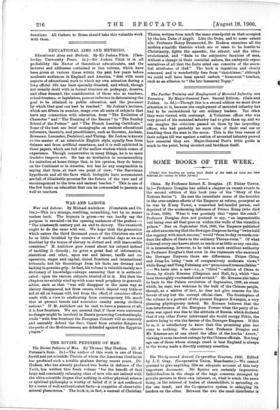WAR AND LABOUR.
War and Labour. By Michael Anitchow. (Constable and Co. 18s.)—This is a strange, rambling, scrambling, but by no means useless book. The keynote is given—we can hardly say the purpose is revealed—in the opening sentences of the preface :— " The nineteenth century put an end to slavery. The twentieth ought to do the same with war. We hope that the generation which enters the third thousand years of the Christian era will be as little troubled by the remains of martial days as we are troubled by the traces of slavery in distant and still inaccessible countries." M. Anitchow goes round about his subject instead of tackling it directly ; he gives a great deal of information, statistical and other, upon war and labour, tariffs and co- operatien, wages and capital, closed frontiers and international tribunals, but his theorisings from his facts are dreamy and lacking in genuine grip. In fact, his volume is valuable mainly as a dictionary of knowledge—always assuming that it is authenti- cated - upon the various subjects treated of in it. But then the chapters invariably wind up with some weak prophecy or generali- sation, such as that " war will disappear in the same way as slavery disappeared, not from causes which depend very little or not at all on human will, but from the effect of conscious efforts made with a view to eradicating from contemporary life much that at present breeds and nourishes enmity among civilised nations." If M. Anitchow can be said to have a panacea at all, it is free frontiers. We are assured that if these were universal no danger might be involved in Russia possessing Constantinople, while "with free frontiers the European Concert will as sincerely and amicably defend the Suez Canal from exterior dangers as the ports of the Mediterranean are defended against the Egyptian lague."


































 Previous page
Previous page